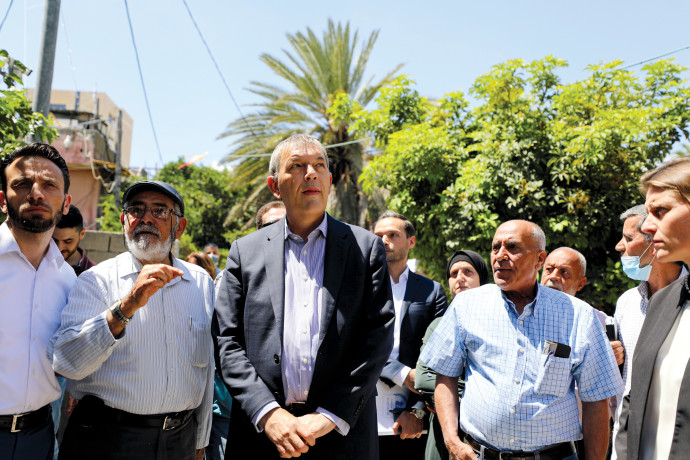The United Nations Relief and Works Agency for Palestinian Refugees is facing an "existential" funding crisis due to a financing drop by donor nations, its commissioner-general Philippe Lazzarini warned in advance of the renewal of his organization’s mandate in the fall.
“I appeal today to member states who have reduced their funding to reconsider the impact of their decision on the region’s stability,” Lazzarini told the UN Security Council in New York on Thursday when the 15-member body held its monthly debate on the Israeli-Palestinian conflict.
"I appeal today to member states who have reduced their funding to reconsider the impact of their decision on the region’s stability."
Commissioner-General Philippe Lazarini
The organization, which was created by the UN in 1949, has a mandate that is approved by the UN General Assembly every three years, with the last such vote taking place in 2019.
UNRWA has overwhelming support at the UNGA, which is not matched in funding by member states.
Lazzarini told the UNSC that support for UNRWA had to be expressed in funding the mandate, not just voting for it.

UNRWA services 5.6 million refugees in Gaza, the West Bank, east Jerusalem, Jordan, Lebanon and Syria. It has a $1.6 billion budget for 2022, of which $817 million is for core programming. To date the organization has received $838m. in donations, just over half of that needed sum, of which $573m. is allocated for core programming.
Money outside of the core programing is used for emergency relief, including for food and cash assistance in the Palestinian territories and Syria, Lebanon and Jordan.
UNRWA fears lack of funding will force it to close programs and or shut down altogether.
Out of the 193 UN member states, only 16 have made pledges of $10m. or more and out of those only four are UNSC members.
Kuwait, which pledged $12m., is the only Arab country on the list of top 16 donors.
UNRWA typically relies on a small number of donor countries who provide a large amount of financing, buttressed by smaller contributions from a larger number of countries.
United States donations
The United States has traditionally been the largest single country to donate to UNRWA, hitting a peak of $364m. in 2017, according to data on the UNRWA website. The former Trump administration then halted all funding to UNRWA. US President Joe Biden initially restored that funding, donating $338m. to the organization in 2021. This year to date, the Biden administration has only pledged $280m., a 17% decrease from last year.
Another 11 nations, out of the top 16 donor countries to UNRWA, have so far reduced their pledges this year, according to data on the UNRWA website.
Lazzarini told the UNSC that his organization provides critical services, explaining that over 80% of Palestinian refugees in Lebanon, Syria and Gaza live below the poverty line.
“In Syria, after 11 years of conflict, the most destitute families are returning to live amid the rubble of their destroyed homes as they can no longer afford rent. Children who returned to demolished camps such as Yarmouk or Ein el Tal walk near unexploded ordnance to take UNRWA buses to school.
“In Lebanon, the pressure on the agency to do more to address the impact of the economic and financial crisis on the Palestine refugee community is becoming unbearable,” he said. In Jordan, the pandemic left deep scars on the labor market. Unemployment is soaring, particularly for females and young people. Child labor and early marriage are reportedly on the rise.”
UNRWA is a lifeline for these refugees, he added.
Opponents of UNRWA on the political Right in both the United States and Israel have argued that the agency is an inefficient way to provide services for Palestinians who would be better serviced through local programs.
They have taken issue with some of the textbooks used in UNRWA school, charging that in some instances the books include material that is antisemitic.
UNRWA opponents have also argued against the organization’s long-standing policy of providing services to descendants of the original refugees from the 1948 War of Independence. Those opponents have argued that this creates an ever-expanding group of refugees that form a stumbling block to the resolution of the conflict.
Lazzarini in the past has rejected accusations of antisemitism. He told the UNSC that opposition to UNRWA is led by those who want to strip Palestinian refugees of rights.
The commissioner-general blamed the chronic lack of funds in part on a “coordinated campaigns to delegitimize UNRWA with a view to erode the rights of Palestine refugees are increasing in frequency and in maliciousness.” This comes at a time when the Israeli-Palestinian conflict has been de-prioritized, he explained.
There has been an annual funding gap of $100m., which has been bridged by “cost control, austerity and carryover of large liabilities from one year to the other,” Lazzarini said.
UNRWA has no more financial reserves left and has reached the “limit of austerity and cost control measures,” he explained.
Funding UNRWA helps ensure regional stabilizing given that failure to provide education, health care and emergency welfare relief to Palestinian refugees leads to the kind of despair which helps fuel violence, Lazzarini said.
“Despair is a threat to peace and stability. Hosts and refugees fear that [the absence of funding] may lead to weakening UNRWA and, with time, dismantling it altogether.”
